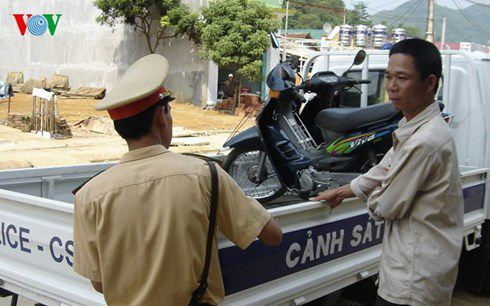Filming traffic police to "blackmail" or defame them is against the law.
Recording traffic police at work is normal, but if clips and images are used for illegal purposes, criminal prosecution may result.
The clip "accusing" traffic police of beating people posted on several social forums at the end of September has been clarified. The traffic violator in the clip, Nguyen Giang Nam (22 years old, from Ninh Binh), in his statement when working with the Traffic Police Department (PC 67) of Hanoi Police, affirmed that he was not threatened by traffic police or anyone. He also affirmed that he did not post the clip online.
However, what is worth mentioning here is that after the clip recording the scene of a heated exchange between a traffic violator and the working group of Traffic Police Team No. 4 at the Dai Co Viet-Giai Phong intersection was posted online, there were concerns about whether people have the right to film traffic police working or not, and whether their actions violate the law or not?
 |
| There is no regulation prohibiting people from filming traffic police on duty (Illustration photo). |
Speaking to VOV.VN reporter, lawyer Ta Quoc Long (Duc Bao Law Firm) affirmed that there is no legal provision prohibiting people from filming traffic police on duty. People monitoring officers of functional agencies performing their duties with pure motives and purposes is an encouraging act to raise awareness and integrity of those performing public duties.
Previously, the Department of Road and Railway Traffic Police issued Official Dispatch No. 1042/C67-P3 dated April 26, 2013, which prohibited filming traffic police officers on duty. This document received strong reactions from the public, the media, and the Department of Inspection of Legal Documents - Ministry of Justice.
This reaction stems from the fact that there have been many incidents and negative public opinions about the phenomenon of some negative things when the traffic police force performs their duties but have not been satisfactorily answered. At the same time, this document contains content that does not comply with the provisions of the law when it was issued.
Immediately after that, the Department of Road and Railway Traffic Police issued Official Letter No. 2315/C67-P6 to cancel the above-mentioned controversial contents. The work of the Department of Road and Railway Traffic Police has shown a willingness to learn and correct errors in issuing professional guidance documents, and at the same time affirmed that the community's supervision of functional forces when performing their duties is legal and extremely necessary.
Traffic police activities are public service activities subject to public supervision.
Protecting citizens' privacy is extremely necessary, because traffic police officers are also citizens, but their activities are public activities subject to public supervision and are not classified as state secrets, so filming and taking photos does not infringe on their personal rights or work secrets and is prohibited by law.
However, Lawyer Hoang Van Dung (Bross and Associates Law Office) further analyzed that through Official Dispatch 2315/C67-P6, it can be understood that if people only record traffic police footage, it is not considered a violation of the law, but if they use the recorded images and clips for illegal purposes such as extorting property or "blackmailing" the people who were recorded, there are clearly signs of violating the law. Posting images of others along with information that insults the honor and dignity of individuals on social networks is a clear sign of violating the law, and can be subject to administrative sanctions or criminal prosecution depending on the level of danger of the behavior and the consequences caused by that person./.
Decree 72/CP dated July 15, 2013 of the Government regulating the Management - Provision - Use of Internet services and information on the network, prohibits the following acts: 1. Taking advantage of the provision and use of Internet services and information on the network for the purpose of: a) Opposing the Socialist Republic of Vietnam; harming national security and social order and safety; undermining national unity; propagating war and terrorism; causing hatred and conflicts between nations, ethnicities and religions; b) Propagating and inciting violence, obscenity, depravity, crime, social evils, superstition, and destroying the nation's traditions and customs; d) Providing information that distorts, slanders, or insults the reputation of an organization or the honor and dignity of an individual; e) Impersonating organizations and individuals and disseminating fake information or false information that infringes upon the legitimate rights and interests of organizations and individuals. |
According to VOV






